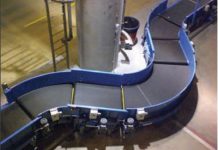
Red Cedar Ventures (RCV), a wholly owned subsidiary of the Michigan State University Foundation in East Lansing, announced its first major investment in UV Angel Inc., a pathogen control technology company based in Grand Haven. The terms of the investment were not disclosed.
This strategic partnership with RCV supports the continued growth of the organization, especially as its technology continues to expand its footprint and product offering throughout Michigan State University’s high-capacity spaces.
“At Red Cedar, we foster strong relationships with the companies we invest in, especially those whose mission focuses on the health and wellbeing of all. Combined with our direct connection to MSU, our investment and partnership with UV Angel was perfectly aligned,” says Jeff Wesley, executive director of Red Cedar Ventures.
“As health care continues to be a priority in every aspect of our lives, we look forward to supporting UV Angel’s growth at MSU and beyond and are proud of their commitment to create a better, safer environment for all.”
Engineered to continuously clean the air and safely operate when people are present with no chemicals or harmful by-products, the UV Angel Clean Air Upper-Room UVGI technology seamlessly integrates a patented infection control platform into the room-ceiling space.
The Upper Room UV Angel Clean Air operates 24/7 completely independent from building HVAC and actively pulls room air into a sealed UVGI infection control chamber, where viruses, bacteria, and fungi are killed up to 99.99 percent. The clean treated air is safely returned to the room to provide a cleaner, safer environment.
“UV Angel has worked tirelessly during this pandemic to bring awareness to the air as a transmission pathway for the coronavirus and other infectious pathogens, and we’re proud to partner with MSU to help reduce pathogens and create healthier environments for MSU students, athletes, and staff,” says Dr. Linda D. Lee, chief medical affairs and science officer of UV Angel.
“Students and staff need to continue to get back to the classroom and experience the benefits of full university life. People are the main source of transmission, and our pathogen control technology provides an engineered and automatic layer of safety against harmful viruses, bacteria, and mold where it’s needed most, indoors, in occupied spaces as people are gathering to work, train, and care for others.”
With a health care background, UV Angel does extensive environmental studies to use science-based designs to validate effectiveness across many types of organizations. On average, it has seen dramatic reductions of bacteria levels between 70-80 percent.
UV Angel currently is used at the MSU Breslin Student Events Center, Wharton Center for Performing Arts, Olin Health Center, and Wonders Hall. More spaces are being considered for UV Angel’s product across campus.
“Amid the COVID-19 outbreak, it was a stressful time for everyone, both for workers on the front lines of health care and also for the students we care for. Like a traditional hospital setting, we also care for a wide variety of cases every day,” says Dr. Keith Nelson, director of health services at MSU Olin Health Center.
“Having a system such as UV Angel Clean Air that’s been proven in difficult healthcare environments and automatically runs 24/7/365 to reduce harmful pathogens, adds an important layer of protection to our in-room occupied spaces.”
UVGI is recognized by the Centers for Disease Control and Prevention (CDC), the National Institute for Occupational Safety and Health (NIOSH), the American Society of Heating, Refrigerating and Air-Conditioning Engineers (ASHRAE), and the EPA.
Upper Room UVGI Air disinfection technology was strongly recommended by the White House during a briefing on air and COVID 19 on March 22 as an effective added protection measure against viruses, bacteria, and fungi.











